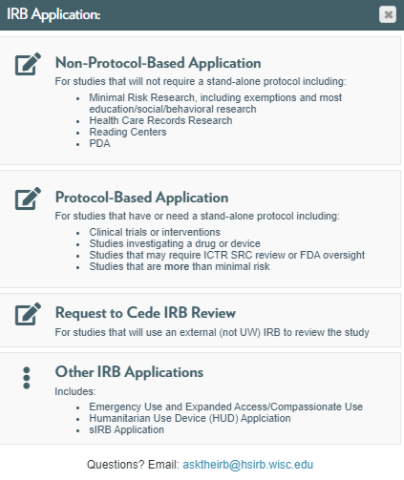HRPP Newsletter March 2022
Issues Pending Timer Changes
During pre-review of an initial application, IRB analysts will enter reviewer comments and send these to the study team to address. When the application is with the study team to address these pre-review comments, the study is in the “Issues Pending” state. Beginning March 26th, initial applications (only) that have been in the Issues Pending state for 45 days will now auto-route to Pre-submission, instead of being withdrawn by the IRB, thereby eliminating the need to submit a request to reactivate. Study teams will receive reminders at 15 and 30 days prior to the study being routed to Pre-submission and a deadline reached notification at day 45. This is only being implemented for the Non-Protocol-Based Application (nPBA), Protocol-Based Application (PBA), and Single IRB (sIRB) Application.
When in the pre-submission state, study teams can continue to work on the application and address IRB comments that have already been entered. When ready, study teams will resubmit the application. The IRB staff will then continue their review process. If significant changes have been made to the study design, re-review by scientific review committees may be appropriate.
Changes of Protocol in Issues Pending currently have 90 days prior to requiring reactivation. As of March 26th, this is being shortened to 45 days. Study teams will continue to receive email reminders.
**As of March 26th, any initial applications in Issues Pending for 45 days or longer will be automatically routed to pre-submission.**
ARROW Application Wizard Updates
In December, the ARROW Application Wizard, the starting point for creating an IRB application, was updated to reflect changes in application types along with a more user-friendly display. Currently, the first two application types listed in the wizard are the Protocol-Based Application (PBA) and the Non-Protocol-Based Application (nPBA), with the PBA being listed first. However, the IRB Office receives more nPBAs than PBAs, and therefore, after March 26th, the nPBA will be listed first, along with some additional language that indicates most education/social/behavioral research should use the nPBA (see screenshot below). The IRB Office hopes these updates may also help study teams avoid selecting the wrong application type.

RELIANT Updates
- Reminder that new single IRB guidelines require a consultation when a study team is asking the UW to serve as the reviewing IRB. This consultation must occur before submission of a grant proposal. The UW cannot guarantee it can serve as the reviewing IRB without prior consultation. More information on the new guidelines is available in appendices A and B of the reliance manual.
- A new question about genetic testing is being added to the request to cede IRB review application at the end of March. The purpose of this question is to identify studies that will be conducting genetic testing that will include depositing of results to NIH’s dbGAP. Specific requirements must be met before data can be deposited to dbGAP and the review process for these requirements varies by reviewing IRB. RELIANT will assist study teams in ensuring this requirement is met.
- Due to volume of requests to cede IRB review and serve as the reviewing IRB, please include a comment with your submission if the request is urgent.
CareEverywhere Cannot be Used for Research
The Epic CareEverywhere user agreement states that CareEverywhere may not be used for research recruitment or to pull records for research purposes. CareEverywhere may only be used to pull new records over for continuity of care. Once records have already been pulled for clinical care, they become part of the UW Health Epic instance as outside documents, which can be used for any lawful purpose.
Cultural Linguistic Services
Need translation or interpretation services for your study? Language Access and Interpreter Services are available for studies involving UW Health patients. Studies outside UW Health can utilize the UW-Madison Cultural Linguistic Services (CLS). CLS offers translation and interpretation services to UW-Madison personnel in six different languages (Chinese, English, Hmong, Nepali, Spanish, and Tibetan). CLS's primary scope is workplace communication, but for-fee services (such as research-related services) are available outside that scope. Services are provided at an hourly rate for a minimum of two hours. When requesting research-related services, study teams are encouraged to plan ahead and build in extra time with their deadlines, as CLS must prioritize workplace communication work. For more information about CLS and for contact information see https://hr.wisc.edu/cls/translation-and-interpretation-services/).
Don’t forget! You can also access Spanish and Vietnamese short form consent documents on the IRBs’ templates page. See the November 2021 newsletter for more information on short form consent updates.
IRB Workshop Recordings Available
In case you missed them or need a refresher, you can watch previous IRB workshops and presentations on demand on the IRBs’ webpage https://irb.wisc.edu/education-training/educational-outreach/. These include the recent IRB for Beginners Workshop and sessions on reliance, protocol templates, the non-protocol based application, and an introduction to the toolkit.
